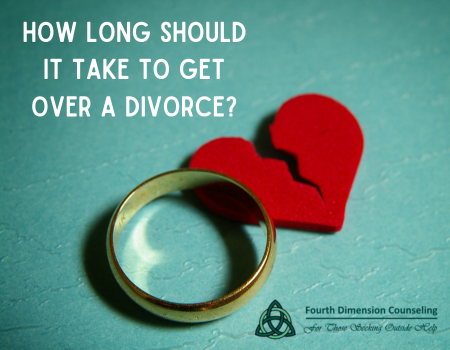Divorce is a life-altering event that often leaves individuals grappling with a myriad of emotions and uncertainties about the future. One common question that arises in the aftermath of a divorce is, “How long should it take to get over a divorce?” The truth is that there is no one-size-fits-all answer, as the healing process is deeply personal and can vary significantly from one person to another. Let’s explore some factors that influence the timeline for recovery and provide insights into how to navigate the journey toward emotional well-being.
How Long Should it Take to get Over a Divorce?
-
 The Complexity of the Marriage: The duration of the marriage and the nature of the relationship play a significant role in determining how long it takes to heal. A short-lived marriage may lead to a quicker recovery, while a long, complex partnership with children, shared assets, and deep emotional connections can extend the healing process.
The Complexity of the Marriage: The duration of the marriage and the nature of the relationship play a significant role in determining how long it takes to heal. A short-lived marriage may lead to a quicker recovery, while a long, complex partnership with children, shared assets, and deep emotional connections can extend the healing process. - Emotional Preparedness: Your readiness to accept the end of the marriage is crucial. Some individuals may have already emotionally detached before the divorce, making it easier to move on, while others may find it more challenging to let go.
- Support System: The presence of a supportive network, including friends, family, and potentially a therapist, can speed up the healing process. Sharing your feelings and seeking guidance from trusted individuals can be immensely helpful.
- Personal Resilience: Each person’s emotional resilience and coping mechanisms are unique. Some individuals naturally recover more quickly, while others may need more time to come to terms with the divorce and its aftermath.
- Financial and Legal Considerations: The complexities of financial and legal matters related to the divorce can extend the healing process. Resolving property, alimony, child custody, and other legal issues may take time and energy, impacting emotional healing.
- Children and Co-Parenting: If you have children, the divorce’s impact on them can influence the duration of your healing process. Coping with co-parenting and ensuring the well-being of your children can be a demanding and ongoing process.
- New Beginnings: The pursuit of new opportunities, goals, and relationships can provide motivation and a sense of purpose. For some, embracing a fresh start may accelerate the healing process.
- Therapeutic Interventions: Therapy and counseling can be invaluable resources for those going through a divorce. A skilled therapist can guide you through the emotional aspects of the process and help you heal more efficiently.
So, how long should it take to get over a divorce? It is crucial to understand that there is no predetermined timeline, and your journey is unique to your circumstances. Grief and healing are not linear processes, and it is normal to have good days and difficult days. It is also essential to remember that healing does not necessarily mean forgetting the past but finding a way to move forward with acceptance and resilience.
While there is no fixed timeline, it’s vital to set realistic expectations for your recovery. Be patient with yourself, seek support when needed, and focus on self-care and self-discovery. Embrace personal growth, set new goals, and gradually, you will find that you are moving toward a place of emotional well-being and a brighter future.
In conclusion, getting over a divorce is a deeply personal journey influenced by numerous factors. The duration of the healing process can vary significantly from one individual to another, and that’s perfectly normal. By acknowledging your feelings, seeking support, and focusing on self-care, you can move forward at your own pace, emerging from the experience stronger and more resilient.
